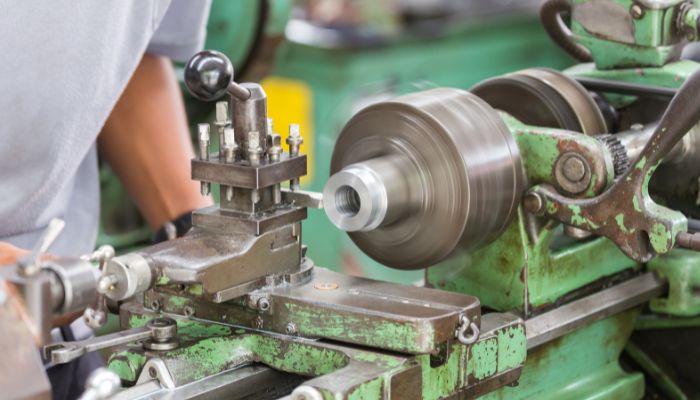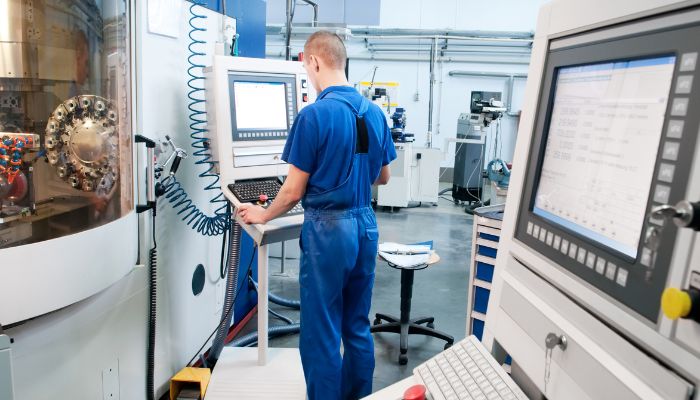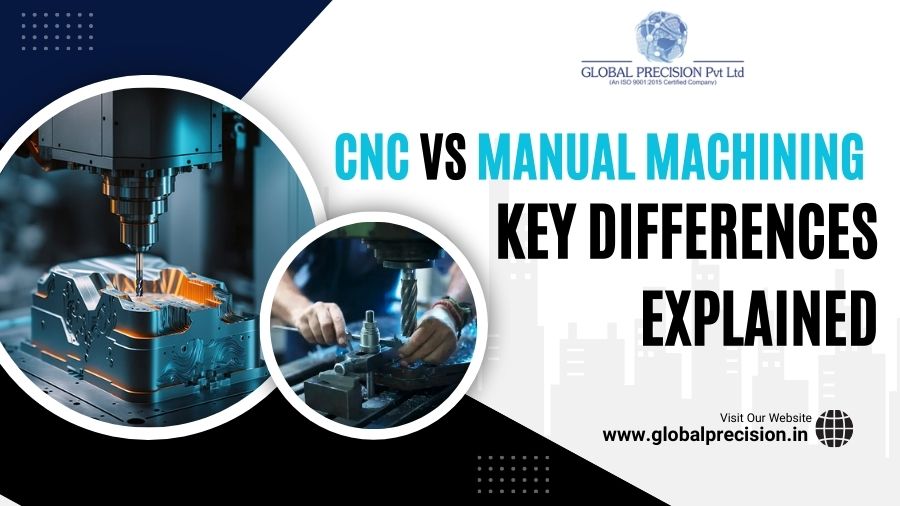Machining is an essential operation in manufacturing, used to make accurate parts and components. Over the years, technology has introduced two main types of machining methods – CNC (Computer Numerical Control) machining and manual machining. While both serve the same purpose, they differ in their operation, efficiency, and accuracy.
This blog explains the key differences between CNC and manual machining to help you decide which method is best for your needs, especially if you are working with CNC machined components manufacturers or looking for CNC milling components. Companies like Global Precision Pvt Ltd are known for their expertise in producing high-quality CNC parts for various industries.
What is Manual Machining?

Manual machining is the traditional process where a machinist operates tools like lathes, mills, and drills manually. The machinist controls the cutting tools and material by hand, adjusting speed, pressure, and direction as needed.
Advantages of Manual Machining –
- Cost-Effective for Small Projects – Manual machining requires minimal initial investment and is suitable for simple, low-volume tasks.
- Skilled Labor – Skilled machinists can produce precise parts without relying on software or computers.
- Flexibility – Adjustments can be made quickly for one-off parts or prototypes without needing programming.
Limitations of Manual Machining –
- Time-Consuming – Manual operations are slower compared to automated CNC processes.
- Human Error – The quality and accuracy depend on the machinist’s skill and experience, which can cause inconsistencies.
- Limited Complexity – Manual machines cannot handle complex designs or large production volumes.
Manual machining remains relevant for smaller workshops or situations where quick, simple parts are needed.
What is CNC Machining?

CNC machining uses computers to control machine tools. The machining procedure is automated using pre-programmed teachings to create precise, high-quality components. CNC machines can produce parts with minimal human intervention, which makes them ideal for industries requiring accuracy and speed.
Advantages of CNC Machining –
- High Precision – CNC machines produce parts with tight tolerances, making them appropriate for industries like aerospace, automotive, and medical.
- Efficiency – CNC machining is much quicker than manual machining, especially for bulk production.
- Complex Designs – CNC machines can make complex designs and complicated shapes that are difficult or impossible with manual machines.
- Consistency – CNC machining ensures uniform quality across multiple parts, even in large production runs.
Limitations of CNC Machining –
- High Initial Cost – CNC machines require a significant upfront investment.
- Programming Skills – Operators need to be trained in CNC programming to operate the machines effectively.
- Not Ideal for Low Volume – For small production runs, CNC machining may not be cost-effective due to setup and programming time.
Leading CNC machined components manufacturers like Global Precision Pvt Ltd rely on advanced CNC technology to deliver quality parts across various industries.
Key Differences Between CNC vs Manual Machining:
Below are the most important differences between CNC and manual machining –
| Feature | CNC Machining | Manual Machining |
| Operation | Automated; controlled by a computer program | Hand-operated by a machinist |
| Precision | High; suitable for tight tolerances | Moderate; depends on operator skill |
| Speed | Fast; ideal for bulk production | Slow; suitable for small projects |
| Complexity | Handles intricate and complex designs | Limited to simple designs |
| Production Volume | Ideal for large runs | Best for low-volume or one-off parts |
| Cost | High initial investment | Low investment, but higher labor costs |
| Labor Requirements | Requires skilled programmers/operators | Requires skilled machinists |
Both methods have their advantages and limitations, making them suitable for different situations depending on project size, budget, and complexity.
When To Use CNC Machining vs Manual Machining?
CNC Machining is Ideal When –
- You need high precision and consistency for large production runs.
- The project involves complex designs or tight tolerances.
- Time is critical, and production needs to be done quickly.
- You are working with CNC machined components manufacturers who specialize in precision parts.
For example, industries requiring CNC milling components, like aerospace, automotive, and electronics, heavily rely on CNC machines for quality and accuracy.
Manual Machining is Ideal When –
- The project involves simple parts or prototypes.
- The production volume is low, and cost-efficiency is a priority.
- You need quick adjustments and flexibility during machining.
- Small workshops or local repair businesses often use manual machining for their day-to-day operations.
The Role of CNC Machining in Modern Manufacturing
With modernity in technology, CNC machining has become a game-changer in modern manufacturing. Companies like Global Precision Pvt Ltd are trusted CNC machined components manufacturers because they deliver precision and consistency on a global scale.
Key Applications of CNC Machining –
- Automotive Industry – Producing engine parts, gears, and shafts with high accuracy.
- Aerospace Industry – Manufacturing complex components that meet strict safety standards.
- Medical Industry – Creating surgical tools, implants, and precision equipment.
- Electronics Industry – Producing small, intricate parts for circuit boards and devices.
- Industrial Equipment – Fabricating components for machines and tools.
CNC machines also play a significant role in producing CNC milling components, which require high levels of detail and precision.
Why Choose Global Precision Pvt Ltd For CNC Machining?

When it comes to CNC machined components manufacturers, Global Precision Pvt Ltd stands out for its commitment to quality and innovation. Here’s why –
- Advanced Technology – They utilize cutting-edge CNC machines to produce parts with unmatched precision.
- Skilled Workforce – Their team consists of experienced engineers and programmers.
- Global Reach – They cater to clients worldwide, delivering consistent quality.
- Custom Solutions – Whether you need prototypes or bulk production, they deliver tailor-made solutions to fulfill your necessities.
- High-Quality CNC Milling Components – Their expertise in milling ensures that complex elements are manufactured with precision and effectiveness.
By partnering with experts like Global Precision Pvt Ltd, you can ensure that your assignments are completed with the most elevated level of accuracy and reliability.
Final Thoughts
Both CNC and manual machining have their place in manufacturing. While manual machining is suitable for small, simple projects, CNC machining is ideal for industries that require speed, precision, and complex designs. Businesses in need of CNC milled and CNC machined components can find excellent solutions from companies such as Global Precision Pvt Ltd.
Think about the advantages of CNC machining if you’re searching for trustworthy producers. Whether you require large quantities or prototypes, CNC technology guarantees constant precision and quality. You can choose the best option for your manufacturing requirements by being aware of the main distinctions.
Your company can gain the competitive advantage it needs in the fast-paced world of today by implementing CNC machining!




